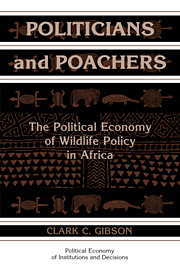Crossref Citations
This Book has been
cited by the following publications. This list is generated based on data provided by Crossref.
Agrawal, Arun
and
Gibson, Clark C
1999.
Enchantment and Disenchantment: The Role of Community in Natural Resource Conservation.
World Development,
Vol. 27,
Issue. 4,
p.
629.
Marks, Stuart A.
1999.
Contextual factors influencing a rural community and the development of a wildlife management regime in Zambia (1987-1997).
Journal of Environmental Policy and Planning,
Vol. 1,
Issue. 3,
p.
235.
Dirlik, Arif
Anand, Dibyesh
Heynen, Nikolas
Powell, Richard C
and
Brown, Michael
2000.
Review: Scholar's Choice, Flexible Citizenship: The Cultural Logics of Transnationality, Poststructuralist Geographies: The Diabolical Art of Spatial Science, Organizing the Landscape: Geographical Perspectives on Labor Unionism, Islands of Truth: The Imperial Fashioning of Vancouver Island, City of Plagues: Disease, Poverty, and Deviance in San Francisco.
Environment and Planning D: Society and Space,
Vol. 18,
Issue. 5,
p.
653.
Haller, Tobias
2001.
Rules which pay are going to stay: Indigenous institutions, sustainable resource use and land tenure among the Ouldeme and Platha, Mandara Mountains, Northern Cameroon1.
Bulletin de l’APAD,
Agrawal, Arun
2001.
Common property, forest management and the Indian Himalaya.
Contributions to Indian Sociology,
Vol. 35,
Issue. 2,
p.
181.
Marks, Stuart A.
2001.
Back to the Future: Some Unintended Consequences of Zambia's Community-Based Wildlife Program (ADMADE).
Africa Today,
Vol. 48,
Issue. 1,
p.
120.
Swingland, Ian R.
Bettelheim, Eric C.
Grace, John
Prance, Ghillean T.
Saunders, Lindsay S.
and
Leader-Williams, N.
2002.
Animal conservation, carbon and sustainability.
Philosophical Transactions of the Royal Society of London. Series A: Mathematical, Physical and Engineering Sciences,
Vol. 360,
Issue. 1797,
p.
1787.
Brechin, Steven R.
Wilshusen, Peter R.
Fortwangler, Crystal L.
and
West, Patrick C.
2002.
Beyond the Square Wheel: Toward a More Comprehensive Understanding of Biodiversity Conservation as Social and Political Process.
Society & Natural Resources,
Vol. 15,
Issue. 1,
p.
41.
Agrawal, Arun
2003.
Sustainable Governance of Common-Pool Resources: Context, Methods, and Politics.
Annual Review of Anthropology,
Vol. 32,
Issue. 1,
p.
243.
Gibson, Clark C.
and
Lehoucq, Fabrice E.
2003.
The Local Politics of Decentralized Environmental Policy in Guatemala.
The Journal of Environment & Development,
Vol. 12,
Issue. 1,
p.
28.
Dzingirai, Vupenyu
2003.
The New Scramble for the African Countryside.
Development and Change,
Vol. 34,
Issue. 2,
p.
243.
Ostrom, Elinor
2003.
How Types of Goods and Property Rights Jointly Affect Collective Action.
Journal of Theoretical Politics,
Vol. 15,
Issue. 3,
p.
239.
Kabiri, Ngeta
2004.
Liberalising environmental governance and the hazards of democratisation.
Local Environment,
Vol. 9,
Issue. 4,
p.
383.
Gordillo, Gustavo
and
Andersson, Krister
2004.
From policy lessons to policy actions: motivation to take evaluation seriously.
Public Administration and Development,
Vol. 24,
Issue. 4,
p.
305.
Andersson, Krister P.
Gibson, Clark C.
and
Lehoucq, Fabrice
2004.
The Politics of Decentralized Natural Resource Governance.
PS: Political Science & Politics,
Vol. 37,
Issue. 3,
p.
421.
Silva, Eduardo
2004.
THE POLITICAL ECONOMY OF FOREST POLICY IN MEXICO AND CHILE.
Singapore Journal of Tropical Geography,
Vol. 25,
Issue. 3,
p.
261.
BERKES, FIKRET
2004.
Rethinking Community‐Based Conservation.
Conservation Biology,
Vol. 18,
Issue. 3,
p.
621.
HENK, DAN
2004.
THE BOTSWANA DEFENCE FORCE.
African Security Review,
Vol. 13,
Issue. 4,
p.
85.
2005.
Environmentality.
p.
201.
2005.
Environmentality.
p.
275.



